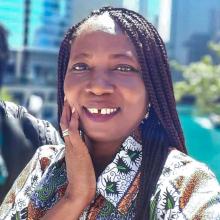Breast cancer survivor preaches routine screening
Abuja, 6 February, 2023 - Gloria Orji was 35 years old when she was diagnosed with stage 2 breast cancer in June 2010.
As an unmarried young woman in her prime, she was devastated because she thought she had her life planned out but finding out she had breast cancer was certainly not a part of her plans.
“I felt shattered and asked the doctor how long I had to live, and he answered who said you will die?” she says, recalling the day she received her result.
Today, she has every reason to be grateful as she is still alive, living healthy, and got married in 2021.
She recounted detecting a lump in her breast during self-examination and informed a friend, who advised her to visit the hospital for a medical check.
“I underwent a biopsy, and cancerous cells were found in
the breast tissue sample. I was then referred to National Hospital, Abuja for treatment,” she says.
Treatment plan
Her breast cancer is at Stage 2 and required six courses of chemotherapy, surgery, and 25 sessions of radiotherapy which lasted 5 weeks.
On completion of the treatment plan, she was placed on five-year-long hormonal treatment and periodic consultations with the doctor.
Believing she had scaled through, Ms Orji, unfortunately, had a reoccurrence eight years later (2018).
“In 2018, I felt another lump in the same breast during self-examination and underwent another round of surgery and treatment”
“Treatment has been financially draining, and I soon became a charity case. Battling cancer, you have no savings as everything goes into treatment to stay alive. My family, friends and doctor have been very supportive,” she says.
A new life
During the course of her treatment in 2017, Ms Orji realized she had a big decision to make as she noticed patients like her depended on their families and themselves for information about their cancers.
Putting her ordeal to good use, Ms Orji supported by friends working as cancer advocates created a support group for cancer patients known as the Network of People Impacted by Cancer.
“Having no reliable source for credible cancer information has been making misinformation about the disease thrive. We (patients) depended on each other for information forgetting that people had different forms of cancers and at different stages. We needed a community where we could get the correct medical knowledge to make informed decisions and advocate for government to support cancer treatment in the country.
Through the group, we have been able to use our voice to advocate for government support for cancer treatment in the country, and a notable success is that the National Health Insurance Act (NHIS) now covers some percentage of cancer treatment. It was not previously so.
Also, through a unified voice with the Health Federation of Nigeria to the legislatures a cancer health fund (CHF) is now available to provide funding and healthcare services to indigent cancer patients in the country, she added.
The CHF program is an initiative of the Federal Ministry of Health that commenced in 2021 with six pilot hospitals.
A plea
“Going through cancer and its treatment has changed me forever. This disease gave me a better perspective on what matters and a renewed appreciation for the people in my life”.
Ms Orji, lamented that many cancer patients in the country could have survived but often present late to the hospital for treatment.
Cancer doesn’t discriminate. It can affect anyone at any age, ethnicity, educational level, and economic status, so we all need to be proactive about our health, eliminate unhealthy habits and listen to our bodies.
People should seek accurate information from reliable sources and support and not discriminate against or stigmatize people with cancer, she added.
Raising awareness about cancer
Cancer is a public health issue of concern, and on 4 February every year, the World Health Organization (WHO) joins the international community to mark World Cancer Day.
In her message to commemorate the 2023 event, WHO Regional Director for Africa, Dr Matshidiso Moeti, says approximately 1.1 million new cancer cases occur each year in Africa, with about 700,000 deaths.
According to her, data estimates show a considerable increase in cancer mortality to nearly one million deaths per year by 2030 without urgent and bold interventions.
She called on Governments to develop/update national cancer control plans, provide sustainable financing, incorporate cancer care into essential benefits packages and national health insurance systems and invest in cancer registration.
Meanwhile, in Nigeria, WHO, with funding from the Susan Thompson Buffet Foundation, provides catalytic support to five states (Anambra, Ondo, Kebbi, Niger and Ekiti) to enable routine cervical cancer secondary prevention services across primary healthcare facilities, to reach up to 5,000 women per state.
The theme of this year is “Close the care Gap: Uniting our voices and taking action.” This year’s campaign summons the government and like-minded people to be united as we build stronger alliances and new innovative collaborations in the fight against cancer. The day reminds us that millions of deaths can be prevented by raising awareness and educating people about cancer.
Technical contacts:
Dr Mary Dewan; Email: dewanm [at] who.int (dewanm[at]who[dot]int)
Dr Sodipo Olutomi Yewande; Email: sodipoo [at] who.int (sodipoo[at]who[dot]int)
Communications Officer
WHO Nigeria
Email: hammanyerok [at] who.int (hammanyerok[at]who[dot]int)
